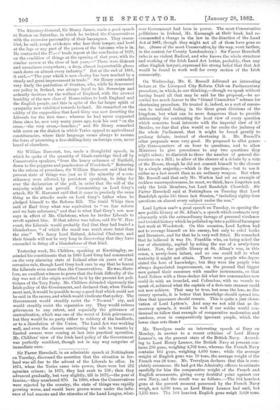On Wednesday, Mr. E. Russell delivered an interesting lecture at
the Liverpool City Reform Club on Parliamentary procedure, in which, to our thinking,—though we speak without having heard all that may be said for the proposal,—he ac- corded too much favour to the "Grand Committee" scheme for shortening procedure. He treated it, indeed, as a sort of conces- sion to national feeling in the three great divisions of the kingdom, but what can be more dangerous than to provide deliberately for contrasting the local view of every question which concerns local interests with the imperial view of it P. Besides, we fear that plan would so far excite the jealousy of the whole Parliament, that it might be found greatly to prolong debate, instead of shortening it. Mr. Russell's other proposals were very good. He proposed to allot gener- ally three-quarters of an hour to questions, and to allow Ministers to give precedence to any two questions they might select; to diminish to three the number of general dis- cussions on a Bill ; to allow of the closure of a debate by a vote. of the House, though he did not commit himself to the closure by a simple majority,—which is the question,—but to use it rather as a last resort than as an ordinary weapon. But when Mr. Russell said that only Mr. Warton had set an example of reckless unscrupulousness, he must, we think, have forgotten not only the Irish Members, but Lord Randolph Churchill. Sir Farrer Herschell said at Nottingham on Tuesday that Lord Randolph spoke 345 times last Session, "including eighty-four questions on almost every subject under the sun."






































 Previous page
Previous page